The Intel Core i7-7700K (91W) Review: The New Out-of-the-box Performance Champion
by Ian Cutress on January 3, 2017 12:02 PM ESTProfessional Performance: Windows
Agisoft Photoscan – 2D to 3D Image Manipulation: link
Agisoft Photoscan creates 3D models from 2D images, a process which is very computationally expensive. The algorithm is split into four distinct phases, and different phases of the model reconstruction require either fast memory, fast IPC, more cores, or even OpenCL compute devices to hand. Agisoft supplied us with a special version of the software to script the process, where we take 50 images of a stately home and convert it into a medium quality model. This benchmark typically takes around 15-20 minutes on a high end PC on the CPU alone, with GPUs reducing the time.
Here we report the overall time to complete the test – sub-test results can be found in Bench.
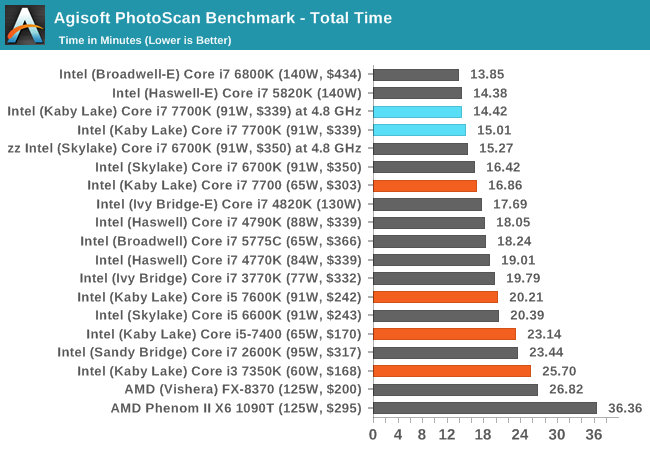
Here’s another instance where a stock Core i7-7700K can overcome an overclocked Devil’s Canyon. Agisoft spends a good time of its workload using cache heavy threads, showing that large core parts do really well, however the i7-7700K is on par with the six-core Core i7-3960X, showing that extra IPC and frequency can make up for a core or two.
Cinebench R15
Cinebench is a benchmark based around Cinema 4D, and is fairly well known among enthusiasts for stressing the CPU for a provided workload. Results are given as a score, where higher is better.
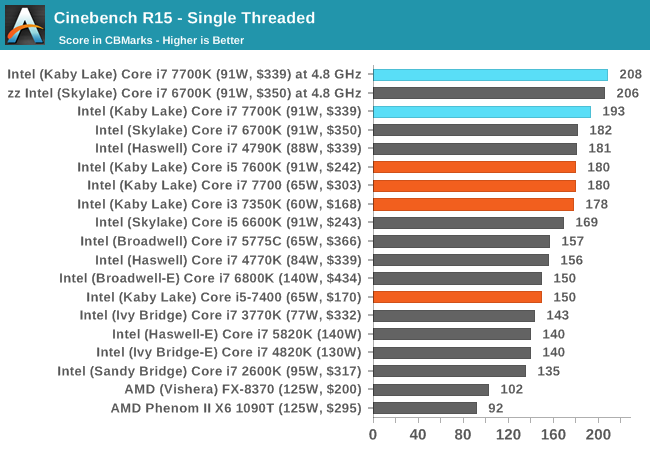
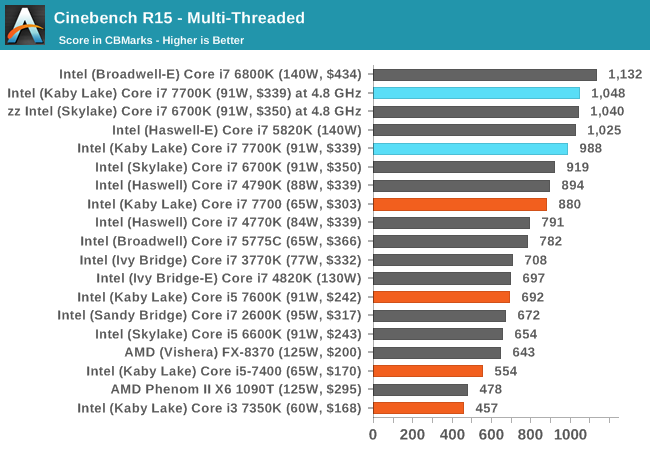
While Cinebench R15 is more a synthetic, it remains a popular test to measure professional performance and is free to use. For single threaded performance, the Core i7-7700K hits the top of the pile. With the Skylake and Kaby Lake parts both at 4.8 GHz, there’s almost nothing between them, showing the identical IPC. In multithreaded mode the 7700K is on top of all the mainstream processors as expected, and when overclocked can mix it up with some of the extreme processors as well.
HandBrake v0.9.9: link
For HandBrake, we take two videos (a 2h20 640x266 DVD rip and a 10min double UHD 3840x4320 animation short) and convert them to x264 format in an MP4 container. Results are given in terms of the frames per second processed, and HandBrake uses as many threads as possible.
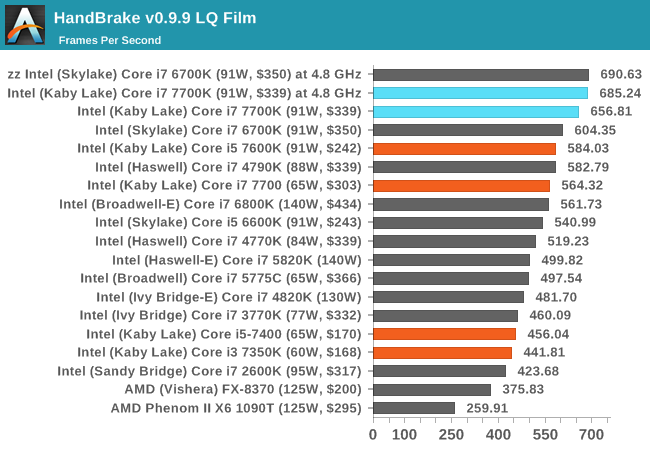
The LQ video emphasizes IPC due to its low cache overhead, meaning that the i7-7700K wins again, and when overclocked, performs the same as the 6700K at the same frequency.
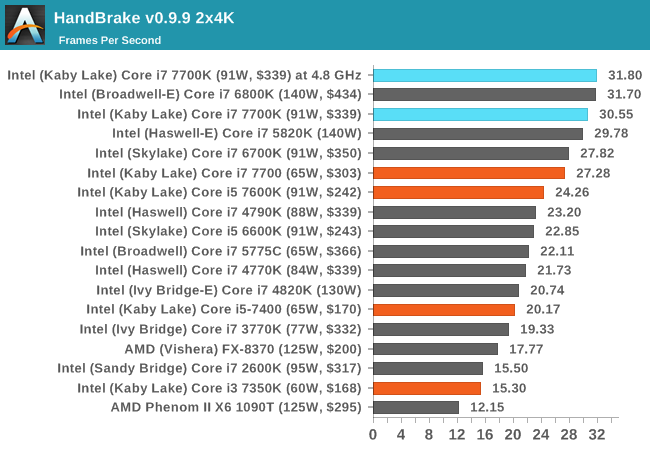
The higher resolution video however means that cores with frequency dominate. The i7-7700K stands above processors such as the i7-5820K, the i7-4930K and the i7-3960X, which is no small feat. But if you really want performance here, the big boys are still top performers (if you can afford them).
Hybrid x265
Hybrid is a new benchmark, where we take a 4K 1500 frame video and convert it into an x265 format without audio. Results are given in frames per second.
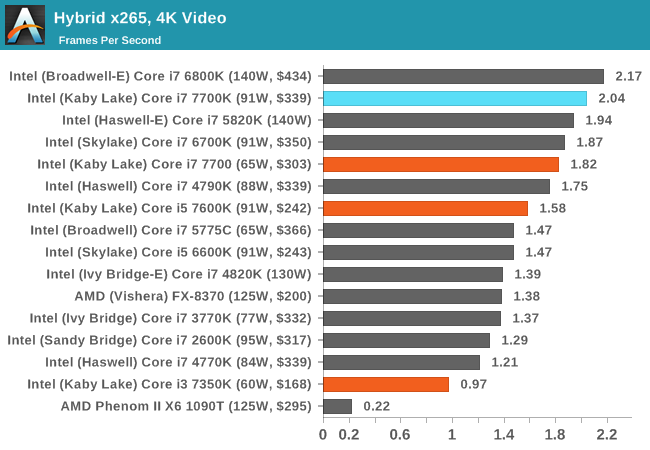
Our Hybrid test is somewhat similar to the HandBrake HQ test, showing the i7-7700K sitting tall as the mainstream champion.










125 Comments
View All Comments
ThomasS31 - Tuesday, January 3, 2017 - link
I meant difference in high end CPUs... ofc. Sorry.Why no edit on your site? :)
pxnx - Tuesday, January 3, 2017 - link
These games are ancient, why even bother benchmarking them?Michael Bay - Saturday, January 14, 2017 - link
>2015>ancient
Mithan - Tuesday, January 3, 2017 - link
I have a 2500k, and I am going to upgrade (its 6 years old).Seriously considering a i7 7700k, people keep telling me to go for Zen because I am going to see a "big difference with games", even though those same people know that Zen will run slower on a per core basis.
I don't see this "big difference" with extra cores in todays games.
We can extrapolate based on current benchmarks, that the i7 7700k will be faster for games, as seen by using the 68xx Intel Series to compare against, even in Ashes of the Singularity.
I can see a "big difference" going from Core i5 to Core i7 or Core i5 to 6/8 Cores, but I don't see a big difference going from Core i7 to 6 or 8 cores in GAMES.
I get that unzipping documents, handbreak, etc are all going to be faster, but I don't particularly care about all those apps I rarely use (if I use them). It isn't like a 7700k is going to choke on Chrome.
I get that a 6 or 8 core will let me play a game and stream content faster (I don't stream).
Can somebody else sound in on my opinion?
DigitalFreak - Tuesday, January 3, 2017 - link
From what's known about Zen so far, you are correct. If all you care about is standard PC stuff and gaming, you're better off with a Kabey Lake i5 or i7. It looks like Zen will be cheaper but similar performing alternative to the Broadwell E processors for those that do more "workstation class" stuff. Of course that remains to be seen until we get some real unbiased benchmarks.close - Wednesday, January 4, 2017 - link
Until we see some retail parts it's hard to get an good idea about Zen. Clocks may vary from ES chips and the price might be motivating enough. 5-10% less performance for 40% lower price could be appealing to anybody who's not looking only at the very highest end of every component.close - Wednesday, January 4, 2017 - link
Also if you plan on holding onto this new CPU for a long time then go for more cores even if it comes with slightly lower clocks. You'll very likely be able to overclock it and squeeze more MHz but you'll never squeeze in more cores. And remember that 6-7 years ago dual-cores were considered the norm while today some games won't even start on a dual core.Game performance is getting less and less dependent on CPU so personally I would always go for the CPU that offers better general performance and more cores than one with slightly higher clocks that focuses the performance in games and gaming benchmarks. If you want better game performance think of a better GPU, that will actually bring palpable improvement over generations.
I'd hold on to the old 2500k for a while, until we get some nice reviews for what's coming.
carticket - Wednesday, January 4, 2017 - link
Just popping in (and registering) to echo that the 2500k is still a great CPU and this is not a great time to hop on the upgrade train with such an incremental upgrade over Skylake.I had a memory failure in my system, and that got me seriously considering a Kaby Lake upgrade, but for what would likely be a $500-600 upgrade, I just don't see a significant benefit. I say this as someone who hopped on the 970 train (upgrade from a 560 Ti) a few months before the 1070s hit the market with vastly better performance.
Toss3 - Wednesday, January 4, 2017 - link
The 7700K is going to be a massive upgrade and definitely worth it if you are currently on something older than Haswell. If your software/games are running at a decent framerate, and you really don't need to upgrade, then I'd suggest waiting as we'll start seeing 6 cores becoming the standard pretty soon (first with Zen and then with Coffee Lake).close - Wednesday, January 4, 2017 - link
Aren't we talking about the exact same massive upgrade a 6700K would have provided a year ago? If that wasn't enough to convince a user to upgrade then why would it be now?Upgrading now means they've just waited one more year with a really old CPU but ended up paying the same price for the same performance this year.
And thinking about an upgrade and those massive benefits just before we finally have a hope that AMD might launch something competitive isn't the best strategy even if your framerates already suffer. For the first time in years Intel might be forced to drop prices but why wait a couple of months when you can pay full price now for last year's CPU, right?